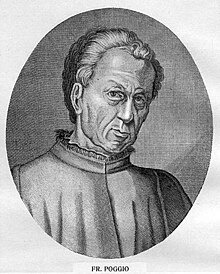Poggio Bracciolini
| Poggio Bracciolini | |
|---|---|

Engraving of Bracciolini
|
|
| Born |
Gian Francesco Poggio Bracciolini 11 February 1380 Terranuova, Arezzo, Tuscany, Italy |
| Died | 30 October 1459 (aged 79) |
| Nationality | Italian |
| Occupation | [Papal Secretary] |
| Children | 5 sons and a daughter |
Gian Francesco Poggio Bracciolini (11 February 1380 – 30 October 1459), best known simply as Poggio Bracciolini, was an Italian scholar and an early humanist. He was responsible for rediscovering and recovering a great number of classical Latin manuscripts, mostly decaying and forgotten in German, Swiss, and French monastic libraries. His most celebrated find was De rerum natura, the only surviving work by Lucretius.
Poggio di Guccio (the surname Bracciolini was added during his career) was born at the village of Terranuova, since 1862 renamed in his honour Terranuova Bracciolini, near Arezzo in Tuscany.
Taken by his father to Florence to pursue the studies for which he appeared so apt, he studied Latin under Giovanni Malpaghino of Ravenna, the friend and protégé of Petrarch. His distinguished abilities and his dexterity as a copyist of manuscripts brought him into early notice with the chief scholars of Florence: both Coluccio Salutati and Niccolò de' Niccoli befriended him. He studied notarial law, and, at the age of twenty-one he was received into the Florentine notaries' guild, the Arte dei giudici e notai.
In October 1403, on high recommendations from Salutati and Leonardo Bruni ("Leonardo Aretino") he entered the service of Cardinal Landolfo Maramaldo, Bishop of Bari, as his secretary, and a few months later he was invited to join the Chancery of Apostolic Briefs in the Roman Curia of Pope Boniface IX, thus embarking on eleven turbulent years during which he served under four successive popes (1404–1415); first as scriptor (writer of official documents), soon moving up to abbreviator, then scriptor penitentiarius, and scriptor apostolicus.
Under Martin V he reached the top rank of his office, as Apostolicus Secretarius, papal secretary. As such he functioned as a personal attendant (amanuensis) of the Pope, writing letters at his behest and dictation, with no formal registration of the briefs, but merely preserving copies. He was esteemed for his excellent Latin, his extraordinarily beautiful book hand, and as occasional liaison with Florence, which involved him in legal and diplomatic work.
...
Wikipedia
